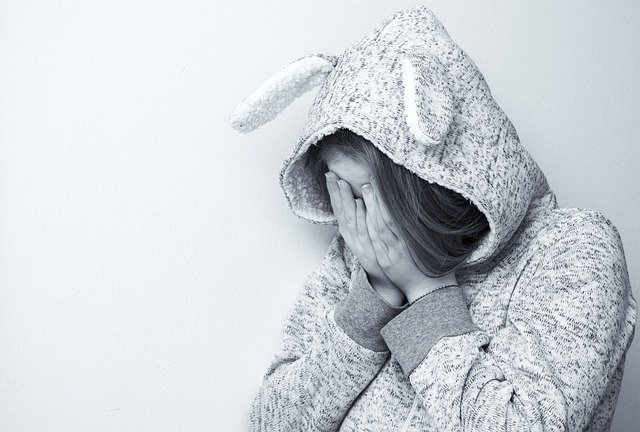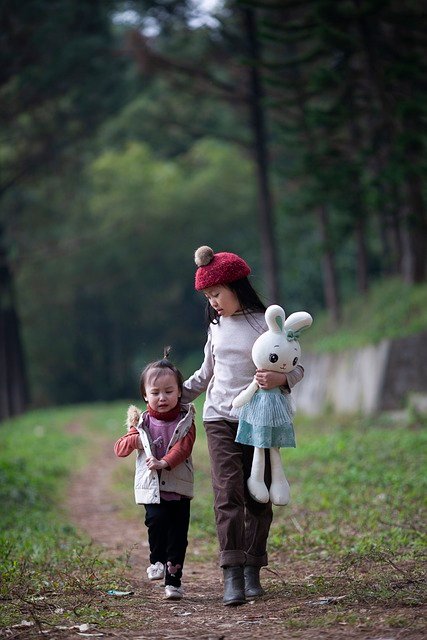Lamento haberle hecho daño a mi hermana (Es/En)

Cuando somos niños nos enfrentamos a problemas aunque tengamos buenos padres. Es cierto que muchos de estos problemas son pequeños desde el punto de vista de nuestros padres. Por ejemplo, el que se le pueda un lápiz en el colegio a un niño puede resultar un gran problema que le genere mucho estrés porque considera que no atendió bien una de sus responsabilidades. Es cierto que la reacción automática de un buen padre es consolar al niño, sin embargo, es necesario que lo escuché con atención y entienda su sentir.
Sería muy apropiado decirles que entendemos que esto es algo que le preocupa y que lamentamos que haya ocurrido pero que eso nos ha pasado a todos, así que lo que podemos hacer es tener más cuidado la próxima vez y de esta manera evitaremos ese problema. Cuando se reacciona de forma impulsiva y se le dice al niño: "Y vas a llorar por eso" o "Eso es una tontería, anda y toma otro lápiz de la caja que compramos", se está cometiendo un grave error porque estamos enviando un mensaje equivocado a la mente de los niños. Y esto fue lo que me ocurrió con mi mamá.
Mientras somos pequeños, tendremos problemas relativamente pequeños pero en la medida que vamos creciendo esos problemas aumentan y si desde pequeños les hemos dado a entender a los niños que sus problemas no son problemas es posible que se corten las vías de comunicación o mucho peor que cuando ocurra un problema grave, ellos no vean la trascendencia del mismo.
When we are children we face problems even if we have good parents. It is true that many of these problems are small from our parents' point of view. For example, a child missing a pencil at school can be a big problem that creates a lot of stress for him because he feels that he did not take good care of one of his responsibilities. It is true that the automatic reaction of a good parent is to console the child, however, it is necessary to listen carefully and understand their feelings.
It would be very appropriate to tell them that we understand that this is something that worries you and that we are sorry it happened, but it has happened to all of us, so what we can do is to be more careful next time and in this way we will avoid this problem. When you react impulsively and tell the child, "And you're going to cry about that" or "That's silly, go and take another pencil from the box we bought", you're making a big mistake because you're sending the wrong message to the children's minds. And this is what happened to me with my mom.
While we are small, we will have relatively small problems, but as we grow up, those problems increase and if from an early age we have given children to understand that their problems are not problems, it is possible that the lines of communication are cut off or much worse that when a serious problem occurs, they do not see the importance of it.

Recuerdo que cuando mi hermana tenía cinco años, se le comenzó a caer el cabello. Fue tanto que mi mamá la llevó al médico. Luego de una serie de exámenes nos sorprendimos porque todo estaba bien. Obviamente, esto fue una buena noticia, pero no encontrábamos la causa de este hecho. Después de varios estudios hasta con un neurólogo, el diagnóstico fue que mi hermanita estaba padeciendo de estrés. Cuando me enteré de la situación, razoné con mucha inmadurez y me pregunté: ¿Qué estrés puede tener una niña de cinco años?.
Claro, para aquel entonces yo tenía quince años y mis razonamientos revelaron la inmadurez que me caracterizaba en ese momento hasta que hablé con mi profesor de psicología. Con paciencia, él me explicó que aunque yo la viera jugando normal como cualquier otra niña, su cerebro captaba todo lo que pasaba en el entorno familiar y aunque no entendía a profundidad qué ocurría, si podía percibir cuando algo andaba mal y esto lo asimilaba su mente y de alguna manera se reflejaría en su cuerpo. Esa explicación me sorprendió y a partir de entonces fui más comprensiva y me avoque a conocer más a mi hermana y a no dar por sentado de que como era una niña no sufriría de este mal.
I remember when my sister was five years old, her hair started falling out. It was so much that my mom took her to the doctor. After a series of tests we were surprised because everything was fine. Obviously, this was good news, but we could not find the cause of this fact. After several studies, even with a neurologist, the diagnosis was that my little sister was suffering from stress. When I found out about the situation, I reasoned very immaturely and asked myself: What stress can a five year old girl have?
Of course, I was fifteen years old at the time and my reasoning revealed the immaturity that characterized me at the time until I spoke to my psychology professor. With patience, he explained to me that although I saw her playing normally like any other child, her brain captured everything that happened in the family environment and although she did not understand in depth what was going on, she could perceive when something was wrong and this was assimilated by her mind and somehow it would be reflected in her body. That explanation surprised me and from then on I was more understanding and I started to get to know my sister better and not to take for granted that since she was a child she would not suffer from this disease.

Resulta que para aquel entonces teníamos una situación precaria en casa, además yo no tenía una buena relación con mi mamá y como mi hermana era muy apegada a mi, le transmití sin querer ese malestar que la perjudicó. Eso me dolió muchísimo porque lo menos que yo quería era hacerle daño a una pequeña personita que me daba tanta felicidad. Por si fuera poco, yo le contaba que me sentía mal. Luego de muchos años fue que entre en razón y me percaté de todo el mal que le había hecho, sin querer, pero lo había hecho. En vez de proteger a mi hermana cómo su hermana mayor que soy, la tomé como una amiga pensando que nada de lo que yo hiciera la afectaría. Hoy en día lamento muchísimo haberle ocasionado este daño a mi linda hermanita.
Aunque después de algunos años mi hermana me contó el problema que yo le había causado, volví a cometer otro error minimizando sus sentimientos. Le dije que no era para tanto y eso le dolió mucho porque en pocas palabras lo que le dije fue "Eres débil" y resulta que la débil siempre fui yo. ¿Cómo se me ocurrió colocarme en el mismo nivel de mi hermana si ella solo era una niña? Al pasar el tiempo me percaté de que me había refugiado en ella porque de alguna manera mi mamá minimizó mis problemas y yo en medio de tanta ignorancia mezclada con rebeldía arrastré a mi hermana sin ninguna mala intención, pero igual cometí un mal.
En fin, el efecto dominó había ocurrido y nos costó recuperarnos emocionalmente. El tiempo transcurrió y poco a poco comprendí que los niños también se estresan y que es un grave error dejarnos ver tan vulnerables por ellos, esto los daña gravemente. Por un largo periodo de tiempo me acompañó la culpa pero ya se disipó y actualmente no subestimo la capacitación que tienen los niños de asimilar los problemas de cualquier miembro de la familia.
It turns out that at that time we had a precarious situation at home, plus I did not have a good relationship with my mother and as my sister was very attached to me, I unintentionally transmitted that discomfort that hurt her. That hurt me a lot because the least I wanted was to hurt a little person who gave me so much happiness. As if that were not enough, I told her that I felt bad. After many years I came to my senses and realized all the wrong I had done to her, unintentionally, but I had done it. Instead of protecting my sister as her older sister, I took her as a friend, thinking that nothing I did would affect her. Today I regret very much that I caused this harm to my beautiful little sister.
Although after a few years my sister told me about the problem I had caused her, I made another mistake by minimizing her feelings. I told her that it was no big deal and that hurt her a lot because in a few words what I told her was "You are weak" and it turns out that the weak one was always me. How did I think of putting myself on the same level as my sister if she was just a child? As time went by I realized that I had taken refuge in her because somehow my mother minimized my problems and I in the midst of so much ignorance mixed with rebellion dragged my sister without any bad intention, but I still committed a wrong.
Anyway, the domino effect had occurred and it was hard for us to recover emotionally. Time went by and little by little I understood that children also get stressed and that it is a serious mistake to let ourselves be seen as vulnerable by them, this damages them seriously. For a long period of time I was accompanied by guilt but it has dissipated and nowadays I do not underestimate the ability of children to assimilate the problems of any member of the family.


These are mistakes that you realize over time, as you mature, as you get older, you see the mistakes you can make as a teenager.
True, it is time that gives you the wisdom to see how many mistakes they make during a stage full of immaturity. In the same way, it hurts a lot when time presents you with your mistakes in the adult stage. What we must do is learn to forgive ourselves and move on.
Thank you so much @jcrodriguez for taking the time to read a very sensitive part of my life.
Greetings 🤗🤗